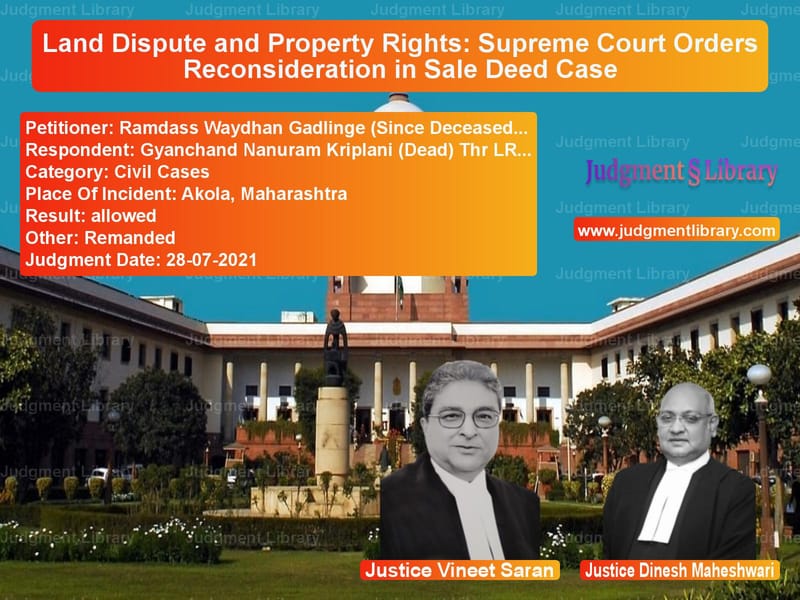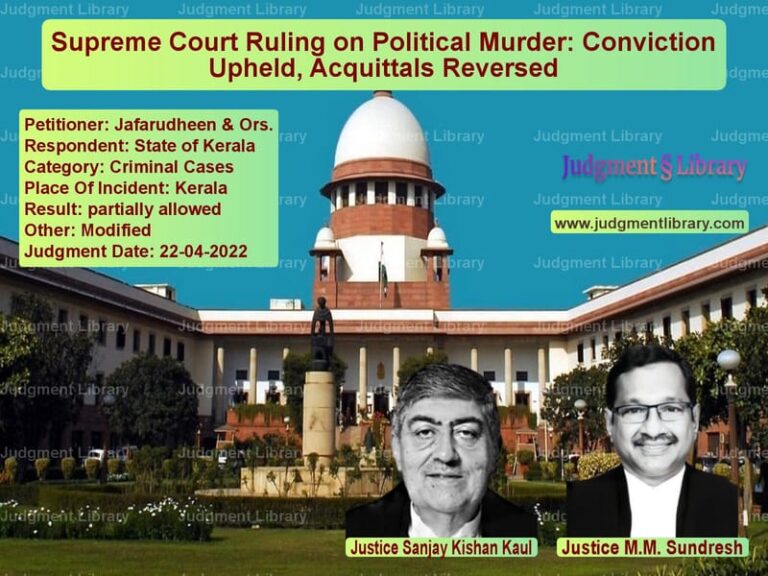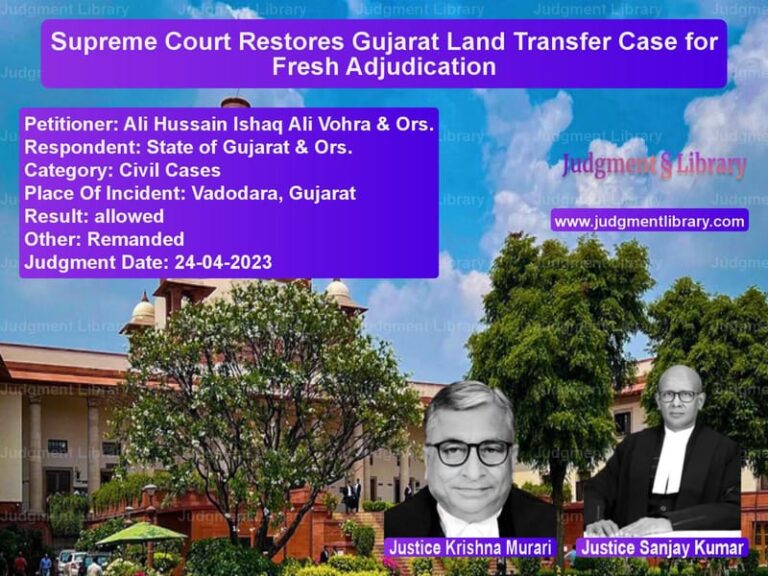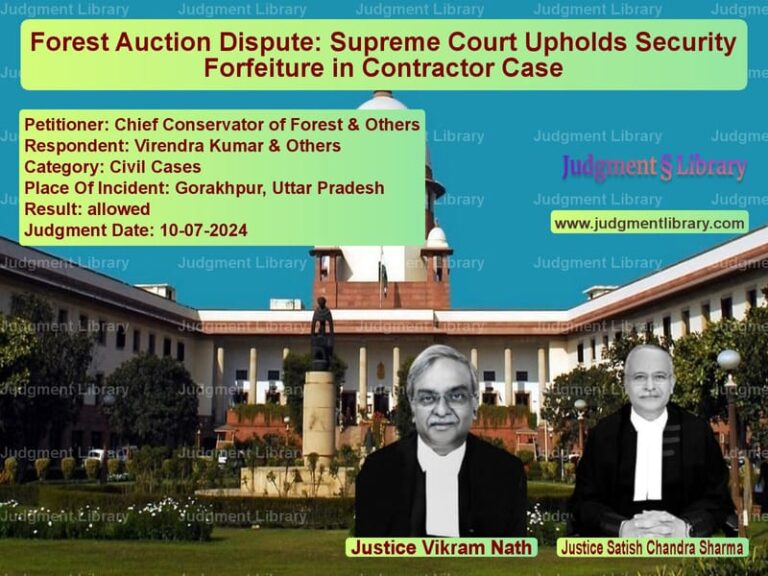Land Dispute and Property Rights: Supreme Court Orders Reconsideration in Sale Deed Case
The Supreme Court of India, in the case of Ramdass Waydhan Gadlinge (Since Deceased) Thr LRs. Vatsalabai Ramdass Gadlinge & Ors. vs. Gyanchand Nanuram Kriplani (Dead) Thr LRs. Dhrupadabai & Ors., addressed a long-standing dispute over property possession and the validity of a sale deed. The Court ruled that the Bombay High Court erred in summarily dismissing the second appeal without examining the substantial legal questions involved in the case. Consequently, the matter has been remanded to the High Court for reconsideration.
The case highlights critical legal issues related to the distinction between an outright sale and a sale deed executed as security for a loan, the burden of proof in property disputes, and the scope of judicial review under Section 100 of the Code of Civil Procedure (CPC).
Background of the Case
The dispute arose over a piece of property in Akola, Maharashtra. The respondent’s predecessor, Gyanchand Nanuram Kriplani, filed a suit in 1995 against the predecessor of the appellants, Ramdass Waydhan Gadlinge, seeking possession of the property and damages. Kriplani claimed that he had purchased the property through a registered sale deed on October 1, 1992, for ₹27,500 and that Gadlinge had initially handed over possession but later illegally took control of the property and leased it to tenants.
Gadlinge, on the other hand, contended that the sale deed was not an actual sale but was executed as security for a loan of ₹27,500. He further claimed that he had repaid ₹19,750 in cash and by cheque and had also given a refrigerator worth ₹7,500 as part of the repayment.
Trial Court’s Findings
The Civil Judge (Senior Division), Akola, after evaluating the evidence, dismissed the suit in favor of Gadlinge, ruling:
- The plaintiff failed to prove that he was put in possession of the property.
- The property was mortgaged for a loan taken by Gadlinge and could not have been legally sold.
- Municipal taxes and electricity bills were paid by Gadlinge, suggesting he remained in possession.
- No evidence was provided to prove that consideration was actually paid at the time of sale deed registration.
First Appellate Court’s Ruling
On appeal, the First Appellate Court reversed the Trial Court’s decision and ruled in favor of Kriplani. Key observations included:
- The defendant’s claim that the sale deed was merely security for a loan was unsubstantiated.
- The defendant’s claim of repaying ₹20,000 via cheques was not supported by credible endorsements.
- The execution of a registered sale deed before a Sub-Registrar raised a strong presumption of its validity as an outright sale.
Accordingly, the First Appellate Court decreed the suit and directed that possession of the property be handed over to the plaintiff.
High Court’s Summary Dismissal of Second Appeal
Gadlinge’s legal representatives challenged the appellate court’s ruling in the Bombay High Court through a second appeal, arguing that:
- The First Appellate Court failed to properly address the nature of the transaction.
- The findings of the Trial Court were reversed without adequate reasoning.
- Significant evidence proving the transaction was a loan was ignored.
The High Court admitted the second appeal and formulated three substantial questions of law:
- Was the judgment of the appellate court erroneous due to an improper formulation of issues?
- Was the appellate court justified in setting aside the Trial Court’s findings?
- Were the findings of the First Appellate Court perverse?
However, despite admitting the appeal on these legal questions, the High Court summarily dismissed it without detailed examination, merely stating that the First Appellate Court’s conclusions were satisfactory.
Supreme Court’s Verdict
The Supreme Court strongly criticized the High Court for failing to properly evaluate the legal questions before dismissing the appeal. The Court ruled that:
“Once a second appeal is admitted and substantial questions of law are formulated, the High Court is required to hear the appeal in detail. A mere endorsement of the First Appellate Court’s findings without analyzing the issues does not satisfy the requirements under Section 100 CPC.”
The Supreme Court further observed:
- Property disputes involving registered sale deeds require careful judicial scrutiny, particularly when one party alleges the transaction was a loan agreement.
- The burden of proof lies on the defendant to establish that a registered sale deed was not an outright sale but executed as security.
- The evidence provided by the defendant, including records of payments and cheque transactions, warranted proper judicial review.
The Court thus set aside the High Court’s order and remanded the matter for reconsideration, directing the High Court to provide a reasoned decision after evaluating all substantial legal questions.
Key Takeaways
- High Courts must conduct a proper analysis of substantial legal questions before dismissing a second appeal.
- Registered sale deeds are presumed valid unless strong evidence proves otherwise.
- Burden of proof lies on the party contesting a sale deed’s authenticity.
- Judicial review of property disputes should ensure fairness in evaluating factual and legal aspects.
Conclusion
The Supreme Court’s ruling in this case reinforces the importance of procedural fairness and legal scrutiny in second appeals. By remanding the case for fresh consideration, the Court has ensured that substantial legal questions regarding property transactions are not dismissed without due analysis.
The judgment serves as a crucial precedent for similar property disputes, highlighting the need for meticulous judicial examination in cases involving alleged loan agreements disguised as sale deeds.
Petitioner Name: Ramdass Waydhan Gadlinge (Since Deceased) Thr LRs. Vatsalabai Ramdass Gadlinge & Ors..Respondent Name: Gyanchand Nanuram Kriplani (Dead) Thr LRs. Dhrupadabai & Ors..Judgment By: Justice Vineet Saran, Justice Dinesh Maheshwari.Place Of Incident: Akola, Maharashtra.Judgment Date: 28-07-2021.
Don’t miss out on the full details! Download the complete judgment in PDF format below and gain valuable insights instantly!
Download Judgment: ramdass-waydhan-gadl-vs-gyanchand-nanuram-kr-supreme-court-of-india-judgment-dated-28-07-2021.pdf
Directly Download Judgment: Directly download this Judgment
See all petitions in Property Disputes
See all petitions in Contract Disputes
See all petitions in Specific Performance
See all petitions in Damages and Compensation
See all petitions in Landlord-Tenant Disputes
See all petitions in Judgment by Vineet Saran
See all petitions in Judgment by Dinesh Maheshwari
See all petitions in allowed
See all petitions in Remanded
See all petitions in supreme court of India judgments July 2021
See all petitions in 2021 judgments
See all posts in Civil Cases Category
See all allowed petitions in Civil Cases Category
See all Dismissed petitions in Civil Cases Category
See all partially allowed petitions in Civil Cases Category







